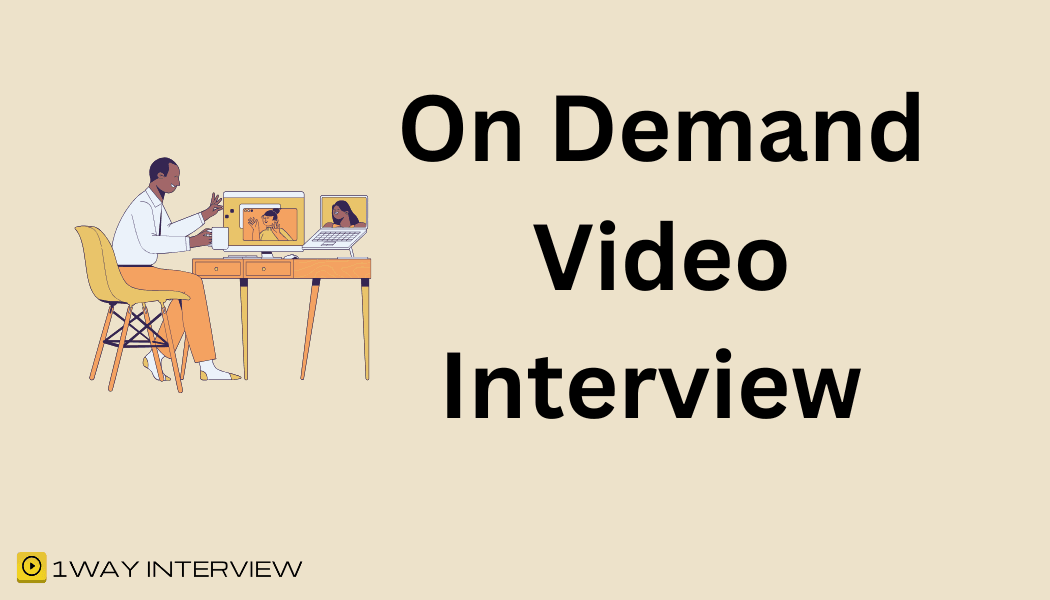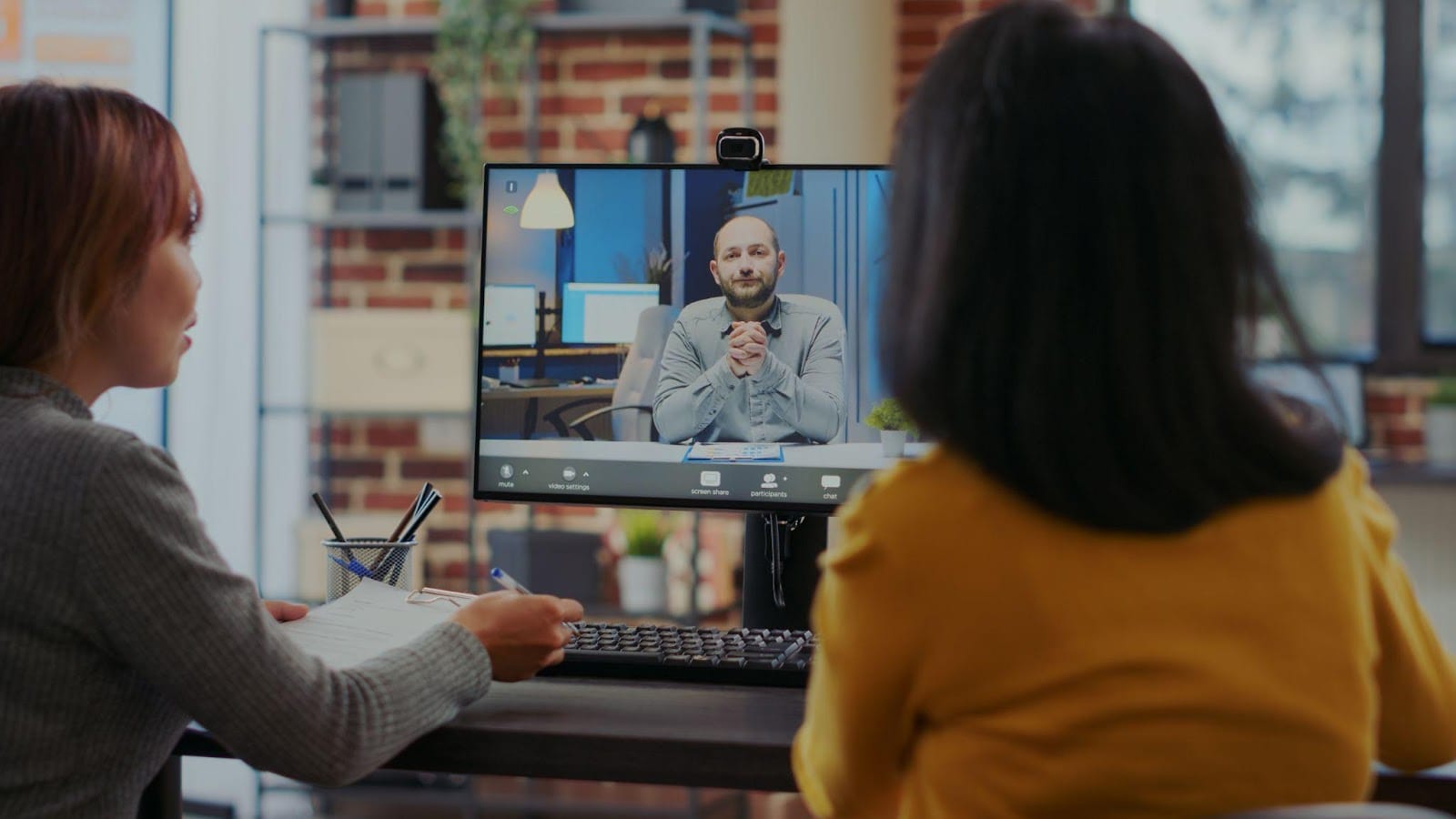Video interviewing tools have become mandatory nowadays as the recruitment is more dynamic than ever. Such tools help to expand the number of candidates and make the hiring process much easier and even more effective. Of all the interviewing methods, the on demand video interviews are one of preferred among employers, HR professionals and recruiters. They are a perfect way to evaluate the candidates, free from the time zone and schedule restrictions of the live interviews. Over half of Fortune 500 companies now utilize asynchronous methods with on-demand video.
Glassdoor reports that hiring a new employee costs an average of $4,000, primarily due to the interview process, but now the “on demand” model has transformed hiring, allowing companies to screen candidates up to 80% faster. This efficiency means a 58% reduction in the time it takes to make an offer, leading to quick placements. It also reduces the time spent on each interview by 81%. Additionally, using this approach can increase a candidate pool by 200%, giving employers a broader and more talented base to choose from.
So What is an On-Demand Video Interview?

On demand interview is an asynchronous interviewing technique that allows candidates to record their answers to a set of predefined questions at their convenience. Where traditional interviews require live interaction or scheduling coordination, this doesn’t. It gives flexibility to both candidates, who can pick a time and place to film their responses, and recruiters or employers, which can view the footage on their own terms. This approach is to simplify the initial screening process therefore employers can efficiently evaluate many applicants and make faster and data driven decisions about who moves on to the next stage.
Where Do On Demand Interviews Belong in the Recruiting Process?
Typically conducted at an early stage, they are ideal for pre-qualifying candidates, replacing phone or initial live meetings. On-demand interviews are helpful for screening candidates as an employer decides who should progress. They also serve to reduce unsuitable candidates and focus on the most promising talent.
Is On Demand Interview a Type of One-Way Interview?
Even if on-demand and one-way interviews reflect the same general approach, they have differences. On demand digital interviews presuppose that candidates record answers to on demand video interview questions unaided and on their own time. That is why such interviews are appropriate for hiring processes that require certain flexibility since candidates do not need to join the interviewer at the same time to record the answers needed. It makes candidates enjoy more liberty.
How Does On Demand Video Interviewing Work?
Compared to web-based synchronous video interviewing, which is a live recorded video interview with some rigidity on the part of the candidate, an on demand video interview differs in some ways. It is a recorded interview based on a flexible format where the candidates record their responses at their convenience. Here’s a step-by-step breakdown of the process:
- Preparation of Questions: Employers provide several questions that are in tune with the job profile, requisite skill set, and competencies. In most cases, such questions are used to test two things: the candidate’s knowledge in the given specialty and their affinity to the organizational culture.
- Platform Selection: The interview is hosted by an interview platform as chosen by employers.
- Candidate Instructions: Interviews are conducted via video link, and the participation information and the link to the interview session are sent to the candidates. Candidates are offered a time frame within which they can interview at their discretion.
- Recording Responses: Respondents record their replies with a restricted number of attempts to do so to guard against fake responses to the questions posed.
- Reviewing and Scoring: Candidates’ answers are recorded and can be reviewed either all together or separately, where the interviewer or a hiring team gets a full understanding of every candidate and his/her potential for a certain position.
How to Conduct an On-Demand Interview?
Several ways will ensure that the on-demand video interview runs well. Here are the core steps:
1. Set Clear Objectives
Make sure every question has its purpose and objectives, where the end goal is to get the best understanding of the suitability of candidates.
2. Choose Appropriate Questions
Interview calls have to include area-specific and behavioral questions that will demonstrate whether the candidate is competent in carrying out analyses as well as whether he or she can work constructively with others.
3. Elaborate Technical Specifications
Ensure that candidates know the technological specs, such as compatibility with gadgets and stability of internet connectivity, to avoid many cases where candidates encounter challenges recording.
How are On-Demand Video Interviews Assessed?
Hiring teams complete scorecards or assessment tools which the platform has offered to grade responses according to factors such as communication, critical thinking abilities, and relevant business skills. Because candidates record their answers, it is possible to have other members of the team listen to the answers so that more than one aspect of the candidate can be evaluated. It eliminates prejudice and makes the process more healthy since selection criterion is passed through a check list rather than impressions.
Why Do Employers and Recruiters Prefer On Demand Interviews?
Because companies are rid of the stress of setting up live interviews on early stages of hiring. It also manages the high volume of applicants since the hiring teams can easily browse through and make their selection. On-demand interviews help in bringing better evaluation of the candidates, minimizing the aspect of bias among the applicants because all are evaluated on the same platform.
Benefits of On-Demand Video Interview for Employers
The opportunities employers get by employing such interviewing system are numerous. Here are some key benefits:
- Time Efficiency: On demand interviews help recruiters to interview several candidates at once and thus reduce the time used in arranging the interview.
- Streamlined Hiring Process: It also means that the video responses can be assessed progressively as they are received, which helps in decision-making. Besides, it requires less time than was traditionally necessary to get the needed number of responses before making a successful hire.
- Scheduling Flexibility: The interview on demand platform has the advantage that the recruiter and the candidates will not have to organize on a certain date and time.
- Standardized Assessment: All candidates who sit for these exams answer predetermined questions; therefore, their performance is easily compared, making the system fair and less ambiguous.
- Candidate Convenience: Interviews can be done at any time and at any given place; thus, the candidate will not have to strain himself so much and come out best in his presentation.
- Global Access: On demand interviews help employers target talent that may be far away, and this takes recruitment to the global level.

Disadvantages of On Demand Video Interviewing
Interviews on demand come with downsides. One of them is the “zero” of real-time interaction: candidates can’t display or prove their soft skills , such as communication or adaptability. A second hurdle is technical issues, when candidates may have poor internet or unsuitable equipment. Time constraints on answering questions may also force candidates to respond in a way not representing who they really are. Finally, lack of opportunity for clarification may lead to misunderstanding, or incomplete answers.
How to Eliminate These Demerits?
To overcome lack of the real-time factor, ensure that instructions and guidelines for applicants are clearly spelt. Concerning the problems with the technology, there are ways to remove them: use a platform as friendly as possible, or provide support in case of any troubles. Finally, time constraints, which can cause candidates to feel pressured, can be resolved with practice questions before the actual interview.
Best Practices for On Demand Interviews
To ensure the success of an on demand video interview, here are some best practices:
- Design Effective Questions: To get an all-round perspective on the strengths and weaknesses of the candidates, integrate both technical and behavioral questions.
- Set Reasonable Time Limits: There is also the sense that offering the candidates ample time to respond allows one to get better answers from the candidates in question.
- Optimize for Clarity: Ensure that all the questions are well framed to minimize the possibility of having ambiguous questions and answers and also to ensure the candidates have a clear understanding of what is expected of them.
On Demand Interview Platforms
There are several on demand video interview platforms available, each offering unique features for recruiters:
- 1Way Interview: One way interview software with an easy-to-use interface and customisable questions. It is free and always available to employers.
- Spark Hire: Self-service is available for asynchronous interviews with rating and commenting tools on candidates’ responses.
- Willo: Video interviewing and recruitment software best known for its simple interface,
- HireVue: Some features that come with HireVue’s platform include analytics scoring and other recruitment tools that enable HR team to have a better analytical look at candidates.
- Vidcruiter: It has complete solutions for the hiring team, including pre-recorded video interviewing, skill tests, and reference checks.
An efficient and accurate on-demand interview means that the recruitment team can get the right candidate through interview management and effectiveness that has been engineered to work without disruption.

On Demand Video Interviewing in the Future of Hiring
On demand video interviews are going to be the major focus of the recruitment process. This suggests that it may well become the baseline standard of interview conducting insofar as preliminary candidate screening is concerned for certain trends like AI integration, remote hiring, as well as primarily digital recruitment schemes. Thus, they offer employers efficient ways of staffing while at the same time providing a more comprehensive approach to candidate evaluation.
At the same time, on demand video platforms may find that additional automated features not only define candidate traits and characteristics in the field of study but also allow for faster, automated scoring and analyzing of video content. Depending on the job or the industry, on demand video interviewing can go further to eliminate conventional on-site video interviewing for initial screening.
Conclusion
Integrating on demand video interviews in recruitment has a myriad of features for employers starting with improved scheduling availability to more efficient candidate evaluation. As the need for remote and digital solutions to hiring increases, on demand interviews are therefore a scalable and sufficient solution for employers and recruiters. Candidates can prepare for an interview through the platform that will help recruiters enhance their hiring performance and reach out to a larger number of applicants.
FAQ
1. Are On-Demand Interviews Fair?
Yes, they can increase fairness by making the interview procedure uniform. Nonetheless, there needs to be clear instructions and well-thought-out questions to give equal opportunity to all candidates.
2. How Many Minutes Does it Take to Do an On Demand Interview?
It depends on the number and complexity of the questions, but they typically take between 15 to 30 minutes.
3. What Kind of Questions Should Be Included?
The questions must be composed of behavioral, situational, and role-based queries for understanding an applicant’s skills and experience.
4.Can On Demand Interviews Replace Live Interviews?
They are useful in the early stages of recruitment, but the comprehensive assessment and final rounds are done face-to-face.
5. How Secure is Data in On-Demand Interviews?
Trusted platforms, such as 1Way Interview, ensure the security of each candidate’s data by encrypting information and complying with data protection legislation.
6. Is an On Demand Video Interview Useful?
For sure. They assist the hiring managers in the evaluation of a large number of candidates in the shortest time possible.
7. Why Are On Demand Interviews Important?
This is crucial because on-demand interviews democratize recruitment by making it progressive, effective and theirs.
8. Does Flexibility Correlate With On-Demand Interviews?
Oh yes, candidates seeking employment can decide on when and where to record their answers. Moreover, the flexibility is available to recruiters themselves who can review the responses anytime they find time to. Thus, the primary outcome of the asynchronous format is advantageous to both parties.

Content marketer at 1Way Interview with a strong background in journalism. Igor leverages his industry insights to create passionate content that helps employers and business owners optimize their hiring routine.